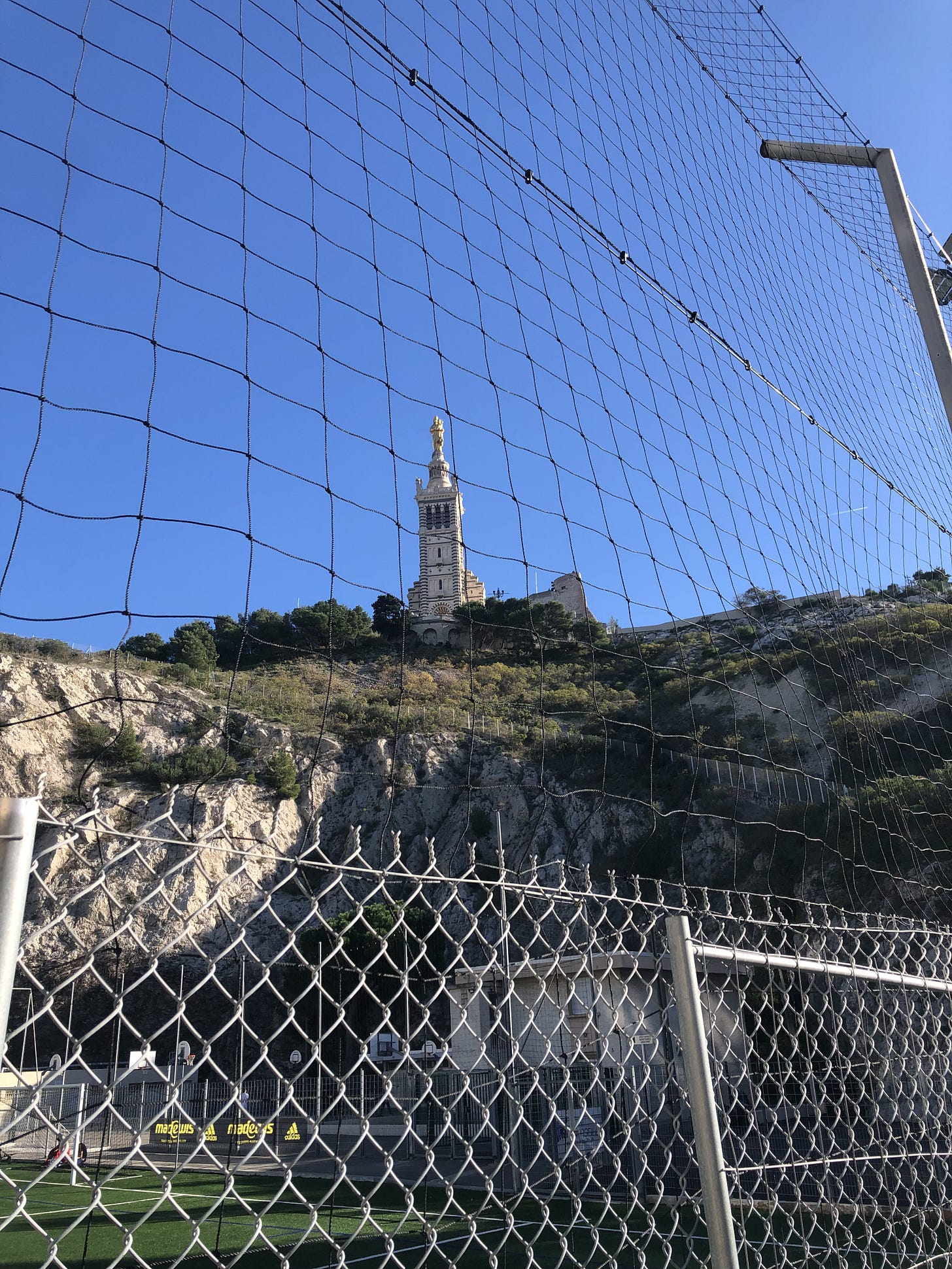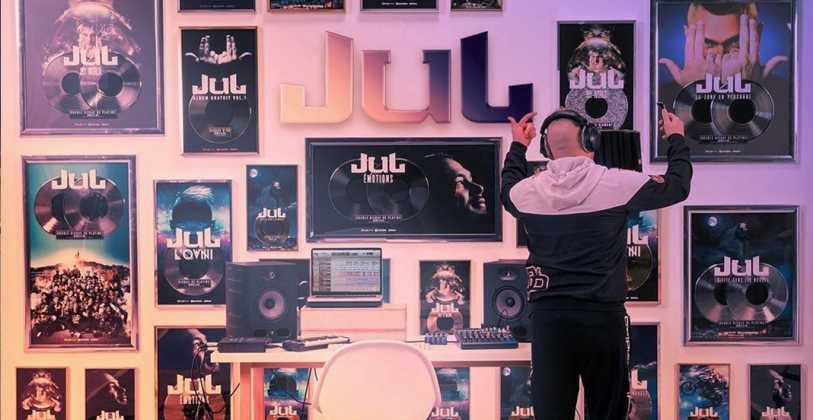Je peux faire un disque de rubi même posé dans une tente Quechua,
Si seulement tu étais à ma place, j'pourrais te dire qu'ils sont durs mes choix.
Pic et pic, alcool et drame – Jul
In November 2022, I visited Marseille. It had been ten years since my first visit, and time seemed to stand still. I remembered every nook and cranny of the city and moved as if I had lived there forever. But something had changed: nowadays, French rap and rap from Marseillaise artists are ubiquitous throughout the city. Every business, shop, restaurant, and car passing by can be identified by the sound, voice, or lyrics of a mainstream rapper. But one stands out above the rest: the three-letter man, Jul. Accompany me as we learn how L'Ovni de Marseille has irreversibly changed the path of French rap.
How Everything Began
J'ai l'cœur blanc, je fais pas le héros
J'ai rempli l'compte, j'suis parti de zéro.
Pic et pic, alcool et drame - Jul
Julien Mari, sometimes known as Jul, was born on January 14, 1990, into a working-class household. Originally from the Saint Jean du Désert area in Marseille's 12th district, he immediately abandoned his studies and began working in menial jobs until joining his father on swimming pool construction sites, a position he would resist for a year before pursuing music full-time. This is a recurring issue in France, where over 10% of pupils drop out of school without completing their education. However, in Marseille, this proportion rises to 17%, leaving many of these young people in a terrible situation with little access to professional employment.
At the age of 17, he began recording music with only a microphone, a computer, and a sound card and was quickly discovered by the Marseillaise label Liga One Industry. At that point, he acquired the moniker Jul and joined the band Ghetto Phénomène. Then, in 2013, he published his first single, "Sort le cross volé," which received over 30 million views on YouTube within a few weeks.
Jul launched his debut album "Dans ma paranoïa" in February 2014, which is still considered one of his best works, with anthems such as "J'oublie tout", a song known from Marseille to Tunis.
Jul went on to create two more albums and started a tradition of giving away free CDs and songs to his fans. After releasing his third album, he left Liga One, accusing them of failing to pay him for CD and T-shirt sales, and founded his label, D'Or et De Platine, which will signal a before and an after in French rap.
The underdog’s on top: democratizing rap
Et ne confonds pas, j'suis pas tes potes
Ferme ta gueule ou j'te casse les côtes
T'as du vice, t'as des sales méthodes
Ouais du vice pour emboucaner les autresPour un violet - Jul
Jul has established himself as an unmistakable star of French rap since 2015. His album My World was a huge success, going gold in three days and platinum in three weeks. One year and a half later, the album has been certified Diamond.
Jul has had a tremendous impact on French rap and beyond. He developed a new musical style that is now inextricably linked to Marseille and has had a global influence on the sound of French rap. The impact of music can be attributed to two factors: the short time it takes to produce the instrumental track, write the lyrics, and record the song, and the music style, which combines an auto-tune-filtered rap with a dance beat with high beats per minute and hints of reggaeton, baile funk (favela music), Raï, Eurodance, and French Variété.
This simplicity of the musical production process enables many young people across the country to create music without making large investments in equipment. Visually and aesthetically, his videos are relatively cheap, filmed in his neighbourhood and other sections of Marseille's Quartiers Nord, and simply feature his friends and neighbours doing daily activities such as riding, driving motorcycles, and enjoying life on the street.
Jul's songs convey the story of each district of Marseille, as well as the daily lives and struggles of individuals trying to get by and make ends meet. His pieces discuss friendship, respect, and honour, relationships with women, and the issues that young people and residents of Marseille experience every day. In "Superstar," he writes, "J'lève la moto, j'prends des risques du Prado jusqu'à l'obélisque," referring to a common pastime that young people do between two representative locations in the city. In addition, references to city iconography appear in both his texts and the visual imaginaries that accompany them, featuring the cathedral of Notre Dame de la Garde, the Vieux Port, the Avenue de La Canèbiere, the cités of Castellane, the beaches of the Prado, and the ever-present sea.

His style is also distinguished by a humble demeanour, reminiscent of the guy who has everything yet continues to live in the same neighbourhood and associate with the same people. References to his beginnings and the difficulties he overcame to reach this point are particularly prevalent in his lyrics, as he stated in "J'oublie tout": C'est Jul qui arrive dans l'game, j'suis venu pour tout niquer. J'traînais avec des gens, j'en ai jamais profité”.
His songs, like any rap lyrics, make references to street life and gangsterism, but they also address these clichés by juxtaposing them with what is everyday living in any Marseille neighbourhood. In this sense, references to luxury companies like Ferrari, Rolex, and Dior compete with mentions of names like Quechua, Asics, and Casio, which represent much more of the spirit of today's people, as in the song “My World” where he states, “Y'a rien d'fantastique, moi j'rentre en Asics”.
That is why, despite his success and popularity, there are still segments of the French people who disagree with what he symbolizes. "Jul embodies the popular par excellence, both in its emphasis on authenticity and spontaneity and in its stigmatisation of so-called bad taste and vulgarity", Emmanuelle Carinos is quoted as saying. That naiveté, in some ways, has led to a segment of the public criticizing and mocking the musician because of his alleged lack of knowledge, which has prompted him, like many other rap artists, to avoid any contact with the media to safeguard his image. This is not surprising because there is a "long tradition of misunderstanding and contempt for rap by a good number of French generalist media, preferring to elaborate and perpetuate a good number of clichés around this musical genre, in an attempt to extract any truth from anyone trying to give it any kind of artistic treatment," according to Pierre Kron in his thesis on the media treatment of French rap. In this sense, one of his recent releases, “Courtois” embodies this idea:
« Ça m'en veut, je reste Courtois
Même quand les jaloux ils persistent
J'ai fait que du bien pour toi
Tu m'as même pas dit merci
Moi j'dis merci à ceux qui m'aiment
Merci à ceux qui me soutiennent
C'qui me soutiennent
Merci à ceux qui s'souviennent »
D’Or et de Platine
J'job toute l'année, j'fais plaisir à la zone
Trop d'condamnés, y a trop d'gens qui maronnent
J’fais plaisir à la zone – Jul ft. SDM
Jul has become the best-selling rapper in French history, surpassing MC Solaar, with over 7 million records sold in less than ten years. He is also the second performer with the most platinum-certified albums (17), trailing only Johnny Hallyday. Three of them are certified diamonds.
There is a lot of debate concerning Jul's music style and the numerous critics he has because of his dependency on autotune. However, it is obvious that this blend has become a signature in French rap, with top-selling musicians such as PNL and SCH recognized for their use of autotune.
However, as many detractors as Jul gets, he is also strongly supported in the French rap scene. Jul's work has received public praise from artists such as Soprano, Alonzo, L'Algérino, SCH, Naps, Soso Maness, Mister You, Gims, Shay, Le Rat Luciano, Nekfeu, Ninho, Soolking, Kofs, and Lacrim, among others. Furthermore, he has collaborated with scores of other French singers, totalling over 259 appearances by 2022.
Jul is mostly supported by his followers, whom he refers to as "La Team Jul," and who number in the millions, with over 4 million followers on Instagram and 1.5 million on Tik Tok. That has helped him become France's most streamed rapper, with over 7.7 million monthly Spotify listeners and nearly 7 million YouTube subscribers, but he is vying for the distinction with Ninho. Furthermore, in June 2022, he became the second artist, after Soprano, to fill the Vélodrome, the stadium of Olympique Marseille, with over 60,000 spectators.
13 Organisé : Marseille takes the lead
C’est past la capitale, c’est Marseille bébé
Bande organisée – 13 Organisé (Jul, SCH, Kofs, Naps, Soso Maness, Elams, Solda, Houari)
Jul is arguably one of the most significant figures in contemporary French rap. His ascension provided the necessary push for the genre to establish itself as one of the most popular among French listeners. As he self-qualifies, “c’est la zone en personne.” Although many have condemned his approach as monotonous and lacking in reinvention, the reality is that he has inspired many other artists, including those from outside France, as seen with Morad. Aside from democratising the genre throughout the country, his growing popularity led other Marseillaise singers to acquire recognition across the Hexagon, repositioning Marseille as a leader in music.
As we have shown throughout this newsletter, musicians have an impact that extends beyond the music industry. Jul is a symbol of Marseille. Much of this credit should go to the joint album "13 Organisé," released in 2020, on which he collaborated with dozens of Marseille artists ranging from major voices to old school stars. The tune "Bande Organisé" impacted the entire country during the continuing COVID-19 outbreak, spending 11 weeks at the top of the French singles chart. Today, the single has over 230 million Spotify streams and over 470 million YouTube views, making it a city-wide reference song, and the video has become a cult, with people visiting the filming locations. Last summer, the song was certified Diamond five times.
Music not only recounts people's stories, but it also produces new vocabulary and references, which assist in sustaining Marseille's distinct character[1]. Many French became acquainted with the Occitan impact on Marseille French at the outset of the song, when SCH begins his couplet with "Oui, ma gâté.". It also made a significant contribution to the establishment of the slogan "C'est Marseille Bebé," which continues the history of other punchlines that have distinguished the city from the rest of the country, such as IAM's "De la planète Mars."[2]
Jul has had such an influence that the city's official tourism website has dedicated an entry to explaining the artist's relevance. Furthermore, in 2023, the rapper began a sponsorship agreement with Olympique de Marseille, with the label D'Or et De Platine's logo appearing on the left sleeve of the team's t-shirt. Nonetheless, politicians, comedians, football stars, and ordinary citizens around the country have used their hands to create the symbol of Jul, occupying not only physical space, as he does with his ephemeral boutique in one of Marseille's most well-known malls, but also referential space beyond music.

References
[1] Kron, Pierre (2018), Les dynamiques du traitement médiatique du rap en France. Les Inrockuptibles, entre distinction and similitude (1990–2017), Université de Strasbourg.
[2] Maëlys TOMA, "« NOUS ON VIENT DE MARSEILLE, COMME DIDIER RAOULT », RAP PANDÉMIQUE ET REFONTE DE L’IMAGINAIRE LINGUISTIQUE MARSEILLAIS", ANADISS 31:121–131.
[3] Chong J Wojtkowski, “100% Marseillais: Marseille Rap and Defining Difference,”
Now listen to it!
In our upcoming issue…
Arab عlt Vol. 4: Du Nord au Sud: French Rap beyond Paris and Marseille





